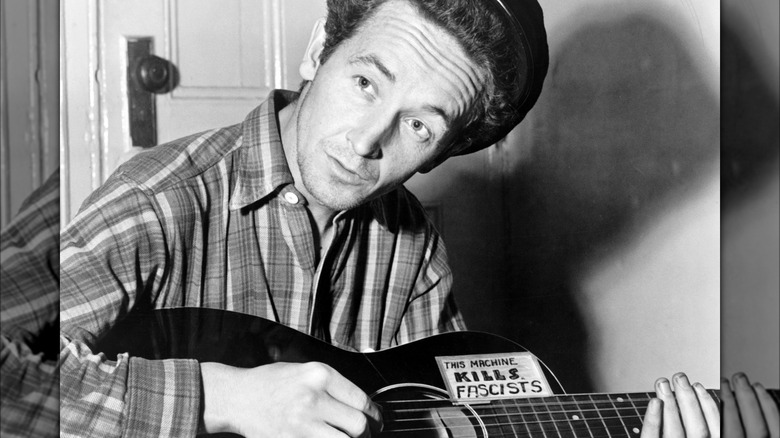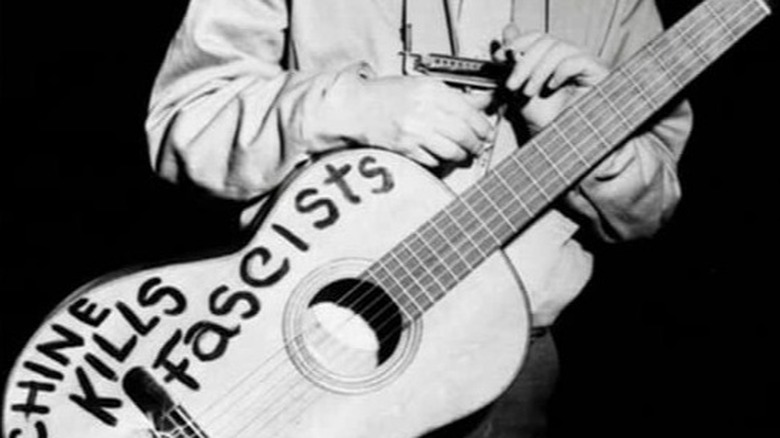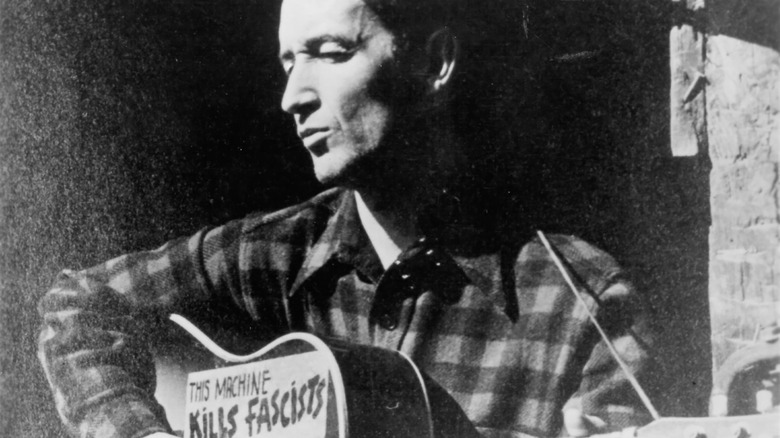The Story Behind Woody Guthrie's This Machine Kills Fascists Guitar
We may receive a commission on purchases made from links.
Humans have been playing the guitar for about 500-600 years, according to Britannica, and by the 20th century, the instrument had become as much a part of certain musicians' identities as the music itself. For example, Willie Nelson has, for decades, been strumming his impossibly-beaten-up guitar, Trigger, which by all accounts appears to be hanging on for dear life. Similarly, blues legend B.B. King refers to his guitars (and there have been several, including one he presented to Pope John Paul II, per MTV News) as Lucille, per Rolling Stone.
Like Willie and B.B., folk musician Woody Guthrie (above) also became linked to a guitar, particularly one that still is immediately recognizable. That's because, since the early 1940s, according to history professor Michael J. Kramer, Guthrie often performed with a guitar (one of many) that bore a message: "This machine kills fascists." The message was, and is, consistent with Guthrie's progressive, anti-capitalist, anti-fascist beliefs, and it has inspired other musicians well after his death.
Woody Guthrie and fascism
(Purchase this image at Amazon for $10.95.)
In order to understand what compelled Guthrie to write "This machine kills fascists" on his guitar, it helps to understand fascists and fascism, and what was so upsetting about it to Guthrie in particular. As Live Science notes, fascism refers to an authoritarian government, often headed by a dictator, that promotes nationalism at all costs — for example, Benito Mussolini's Italy. However, the same site also notes that fascism is hard to define. It's entirely possible (and perhaps not unreasonable) to call a politician you don't like a "fascist," or a set of laws you don't like as "fascism." If you're a progressive who believes that capitalism makes the poor poorer and the rich richer, you might consider the capitalist system as fascist.
What does any of this have to do with Woody Guthrie? By the 1940s, he'd come to embrace progressive ideals, and in particular he was sympathetic to the poor and oppressed, as The Kennedy Center explains. With his lyrics and music opposing capitalism and oppression and supporting progressivism and the common man, Guthrie's guitar was "killing fascists."
He borrowed the phrasing
As it turns out, Guthrie wasn't even responsible for the phrase he emblazoned on his guitars, according to history professor Michael J. Kramer. Guthrie purportedly borrowed it from factory workers providing material for the war effort during World War II. The workers wrote it on their lathes. In much the same way that the workers' machines "killed" fascists, however indirectly, Guthrie's "machine" "killed" fascists in the sense that his music and lyrics battled to defeat their ideals.
Guthrie was photographed holding various guitars with various iterations of the phrase. Sometimes the words were on a sticker attached to the instrument, or perhaps the declaration was painted directly on the guitar.
The guitars themselves weren't the only reference to anti-fascism in Guthrie's music. One of his most famous songs also explains the folk singer's opposition to what he considered fascism: "All You Fascists Bound to Lose" (on YouTube).


